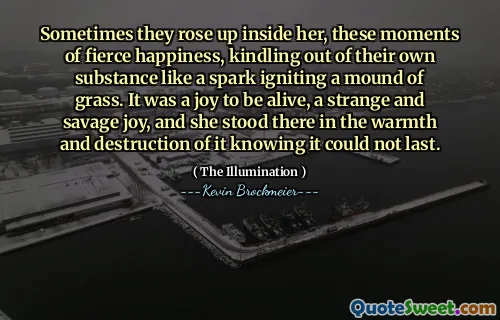
Sometimes they rose up inside her, these moments of fierce happiness, kindling out of their own substance like a spark igniting a mound of grass. It was a joy to be alive, a strange and savage joy, and she stood there in the warmth and destruction of it knowing it could not last.
This quote eloquently captures the ephemeral yet intense nature of fleeting moments of happiness. The imagery of these moments 'rising up' inside her paints a vivid picture of emotional eruptions—bursts of joy that feel almost wild and uncontrollable. Comparing these bursts to a spark igniting a mound of grass emphasizes both their suddenness and their potential to spread, suggesting that even brief moments of happiness can possess a fierce energy that ignites one's entire being. The description of the joy as 'strange and savage' highlights its rawness and intensity, distinguishing it from tame or predictable emotions. The acknowledgment that this joy 'could not last' introduces a poignant awareness of the impermanence inherent in life's most profound experiences. It evokes a sense of both appreciation and melancholy—as if she savors these fleeting instances knowing their transient nature. Symbolically, this reflects an understanding that life is a collection of transient delights, each capable of igniting a deeper sense of consciousness and vitality before fading away. The backdrop of warmth and destruction suggests that embracing such fierce happiness involves accepting vulnerability and impermanence, recognizing that moments of intense joy might come with the cost of emotional upheaval. Overall, this reflection aligns with themes of human fragility and resilience—the capacity to experience profound happiness amidst the inevitable course of change and loss.






